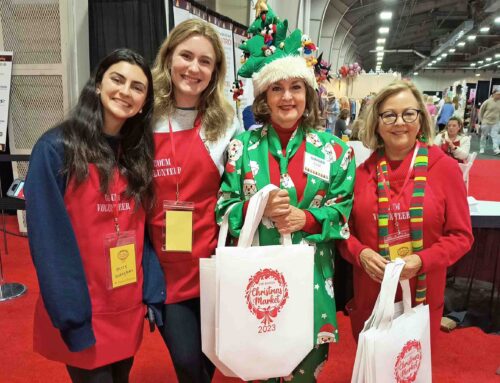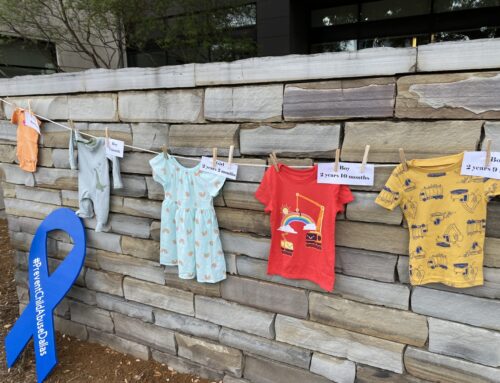In all her years wandering the Sudanese wilderness, surrounded by other pre-teen children and attempting to remain alive, Priscilla Deng witnessed one tragedy that stayed with her. It was a young girl on the side of the road, in the dirt, giving birth unattended.
Joining that girl in her fate became Prescilla’s greatest fear — more than the ethnic cleansing that left her orphaned, homeless and on the run, more than the war raging around them, more than the starvation and wild animal attacks that took the lives of hundreds of other refugees. More than anything, she feared bringing a child into the world alone and unaided.
Priscilla met her future husband, Joseph Deng, within the cramped confines of a United Nations-run refugee camp in . Both had been orphaned by the country’s civil war, entering the camp as living skeletons from years of starving, and both lived within its overcrowded confines for more than a decade, falling in love and eventually marrying. Though neither knows exactly how old they are, it’s safe to say they made the rapid ascent from childhood to adulthood together.
“I met and knew Joseph at camp; that was good, but camp was just terrible, terrible,” says Priscilla, who, having gone without school her entire life, is still attempting to learn English two years after moving to Dallas. “It was terrible with no food. Just very bad.”
The conditions she described were abysmal. Most refugees received only a small meal a day, and medical supplies were in short supply, due to the frequent robbery of supply trucks by armed gangs around the camp. And things became worse for Priscilla with two events that, in other circumstances, would both have been cause for celebration — she became pregnant, and two months later, Joseph was selected for immigration to Dallas, so he couldn’t be present for his son’s birth. Priscilla would have to do everything herself.
After moving to Dallas, Joseph became a Lost Boy of Sudan, a group that has become a cause célèbre of the international aid community. More than 4,000 of these Lost Boys have immigrated to the since 2001, an exodus that has been the subject of widespread media attention, numerous best-selling books and an award-winning documentary or two. But very little attention has been paid to the Lost Girls. This is perhaps because so few make it out of the refugee camps — only about 90 so far, roughly a dozen of whom have settled in Dallas.
“In the camps, girls weren’t the big concern,” says Anne Worth, a neighborhood resident and professional counselor who befriended many of the area’s Lost Girls through her volunteer work with local church Fellowship Dallas.
“All the boys are allowed to group together and can form these little gangs within the camps. Keeping them packed tight in these crowded camps for years, the government started worrying these thousands of guys are going to get violent and revolt, so they started sending them away. But the women, there weren’t as many of them, and they are all separated, so they’re not any real concern. They’re seen as property, basically.”
According to Beverly Parkhurst Moss, a neighborhood resident and author of a self-published book on the Lost Girls titled “Dark Exodus,” the Lost Girls are often sent to live in the camps with other families, whom they serve as unpaid servants — or, as Parkhurst Moss says, “de-facto slaves.” Priscilla agrees, saying many girls apply for deportation on the sly, without their caregiver’s knowledge.
“To marry a woman over there, you have to pay their family a lot,” Parkhurst Moss says. “So these people over there say to girls like Priscilla, ‘You’re in our family now, you can’t leave.’ They (the Lost Girls) would usually tell their families they were leaving days before they left. They’d say, ‘Guess what?’ and families would be dumbfounded. But it’s very hard for them to get out. The only real reason the border opens for them is if they’re married, and mainly, if there’s money there.”
For Priscilla and Joseph, the necessary money may as well have fallen from the sky. Most Lost Boys are employed in fairly low-paying jobs due to their lack of education, and Joseph was no different. For more than a year after first moving to Dallas, Joseph was employed as a shopping cart retriever at Central Market, sending money to Priscilla when he could, but far from earning enough to get her and his new son, Aguer, to . Until one day Joseph made a fairly unusual discovery — a shopping bag filled with $3,000, innocently sitting in an abandoned shopping cart.
“Now, this money could’ve changed his whole life,” says Worth, who tells the story with far more enthusiasm than the reserved Joseph and Priscilla. “He could’ve used it to help people in the camps, get his wife and son over, so what does he do? He gives it to his manager.
“The manager is just flabbergasted. He’s like, ‘Are you serious? Joseph, why didn’t you take this?’ And Joseph tells him, and I quote, ‘God is my provision.’ … Naturally, they give him a job handling the store’s cash.”
Joseph’s heightened salary as a cashier, as well as the job he was able to secure Priscilla in the bakery of his store, allowed him to move his wife and child to Dallas. They work together every day now, when Priscilla isn’t attending culinary school with the help of the Fellowship Dallas, and they just had a baby daughter named Ajak about a year ago. While she doesn’t like to speak about giving birth at the refugee camp, Priscilla says giving birth to her daughter in a modern hospital, surrounded by doctors, was much different.
“You can not think how much better it was,” she says. “You can’t think it.”
In the months Beverly Parkhurst Moss spent interviewing Dallas’ Lost Girls for her book, “Dark Exodus”, many things struck her about the refugees. Their faith, she says, seems to come from a “deep well”, and she says it deepened her own.
Their intelligence and the ability of some to articulate, despite little formal education, surprised her again and again. Parkhurst Moss found much to love about the girls, but also much that haunts and disconcerts her to this day.
Their nonchalance, for example.
“Sometimes, it was like they were just talking about the weather,” Parkhurst Moss says. “They’ll just calmly be like, ‘Oh, and then, you know, the Arabs came in and burned my village. And then they killed my parents. Then we ran.’ Like they’re talking about what they ate that day. You realize they’re just so distanced from it and traumatized.”
Since she first met the Lost Girls at a Fellowship Dallas function, Moss says she has become “a late-in-life activist”, outraged at what happened to the girls and how little her neighbors know about it.
“It’s just such an injustice,” she says. “One in five of these people survived, yet not many people even know about them. If they did, I think, they’d help.”
While she believes there are better agencies helping those still in refugee camps, Parkhurst Moss has set up a non-profit organization to help Dallas’ Lost Girls with funds for education and childcare, named the Dark Exodus Women’s Foundation. For information on the foundation, or on her book, contact Parkhurst Moss at bevpark1@sbcglobal.net.
FINDING THE LOST GIRLS
While she came in contact with numerous refugees through outreach work with Fellowship Dallas, Anne Worth didn’t come across the Lost of Sudan until she set out to do so. “I’d just seen a documentary called ‘God Grew Tired of Us’ about the Lost Boys, and I told a friend I’d like to meet a Lost Boy and show the movie to him,” Worth says. “We found one, and he asked whether we wanted Lost Girls to see the movie as well. I said I didn’t even know there were Lost Girls.” Thus began Worth’s friendship with the Lost Girls community. About a year ago, she decided to leave her private-practice counseling job of 25 years and assist the Lost Girls full-time as “a stateside missionary,” as she describes it. This has included tea parties, meals, movies and their introduction to the wider Dallas community. Worth also has helped arrange for the Lost Girls to speak at local churches and a recent rally for Darfur in Dallas, and she anticipates more speaking engagements with the recent publication of Moss’ book. To arrange a speaking engagement, or for information about befriending or otherwise aiding the Lost Girls, contact Worth at 214.987.0811.





